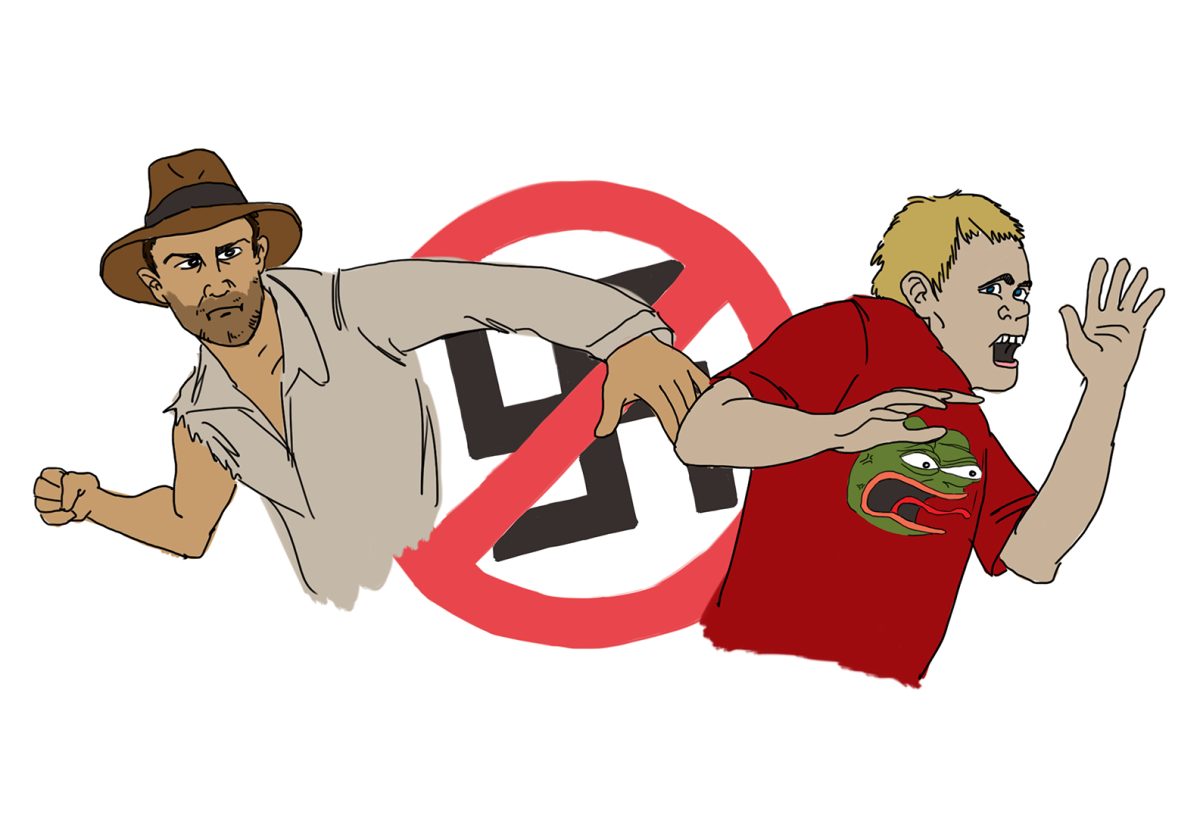Indiana Jones: professor, archaeologist, but American hero? Not even close. He betrays one of the most basic American ideologies: freedom of speech.
This charlatan shuts down all chance for discourse in both “Raiders of the Lost Ark & The Last Crusade.” Instead of these films allowing the xenophobic, genocidal axis army to defend themselves, they portray them as a xenophobic, genocidal axis army.
For example, as Ms. Ravenwood and Dr. Jones are escaping the dig site, a bare-chested, mustachioed soldier confronts them. Instead of partaking in civil debate about their intellectual differences, Jones engages the man in fisticuffs for interrupting him. This was the perfect opportunity for intellectual discourse— but no, that wasn’t acceptable for “Raiders of the Lost Ark.”
In “The Last Crusade” this behavior is even more blatant and egregious. A sizeable portion of Act 2 of the film is set in a Nazi occupied castle, with Dr. Jones and his father, Dr. Jones Sr. totally not being held there against their will. Alas, much like the first movie there is zero attempt for discord, but instead only castle arson and property destruction committed by the Jones family.
This particular style of screenwriting raises some questions. Why are both sides not being represented equally? The ideological content of what each side is arguing doesn’t matter. The amount of support, or lack thereof, is irrelevant. As Americans, they have a right to say whatever they so choose.
In addition to freedom of speech, they should all be entitled to a freedom of consequence. In “The Last Crusade,” when Walter Donovan affirms his apathy towards the Nazi’s real motives, Jones is visibly disgusted by this revelation, exposing himself as the truly intolerant one.
The movies of Dr. Jones’ exploits are quick to establish him as the swashbuckling hero and the Nazis as the mustache twirling villains. They imply what the Nazis do is evil, but if we are to be completely honest, there is violence on both sides.
Indiana Jones punched and shot a myriad of men while the Nazis attempted to harness the power of God almighty, the Abrahamic creator of all, and use it to conquer all countries and peoples. Both sides were equally in the wrong here; the blame lies evenly distributed in this situation.
However, the writers and director don’t see it this way, of course. They see the raiders of the lost Ark to be in the wrong during this situation, evident by the ending of the first Indiana Jones movie. While Jones escapes the climax with zero punishment for his lack of political open-
mindedness, the Nazis suffer spontaneous face-melting. Why would Steven Spielberg feel the need to put something so political in his movie, as if he were checking items off some kind of list.
Indiana Jones cannot be an American icon if the series alienates a specific sect of Americans, such as 1930’s Nazis. These movies portray Nazis in a way that damages their overall image by presenting them in full context so everyone can get a sense of who they really are.
– Jordan Pilkenton is a psychology sophomore and an avid Indiana Jones supporter. #feeltheIndy
Indiana Jones negatively portrays Nazis
September 28, 2017
Illustration by Kennedy Swift | Staff Illustrator
0
Donate to The University Star
Your donation will support the student journalists of Texas State University. Your contribution will allow us to purchase equipment and cover our annual website hosting costs.
More to Discover








